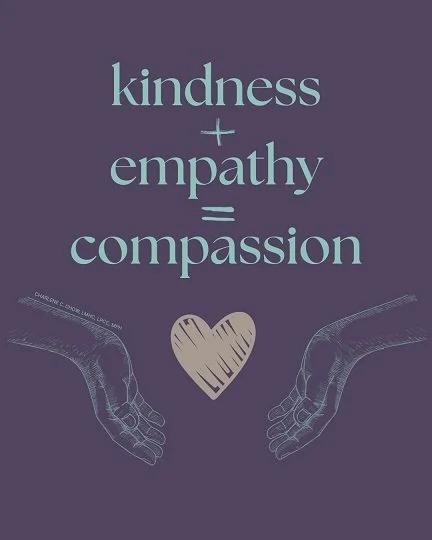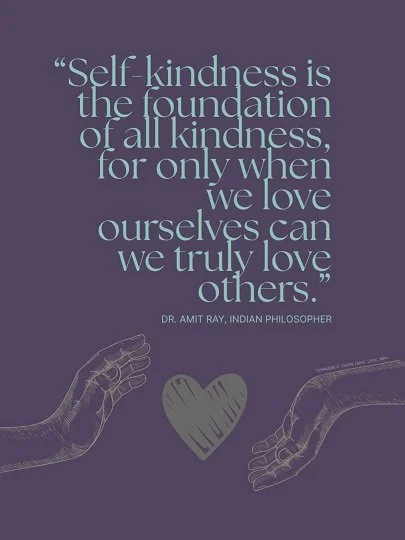Self-Compassion: Giving Yourself Grace This Thanksgiving
Have you found it harder to thrive lately?
The end of Daylight Saving Time has brought long nights and Seasonal Affective Disorder for many. The sociopolitical climate remains hostile. Students are in exam mode. Workers are scrambling to close out Q4. And the upcoming holidays bring even more challenges.
We're supposed to feel grateful, connected, and joyful. But for many of us, Thanksgiving kicks off a six-week pressure cooker of travel, financial strain, family reunions and social gatherings (or, on the opposite end, loneliness and isolation). This means navigating burnout, managing stress and broken routines, dealing with old trauma triggers, and just trying to survive.
It’s exhausting.
This year, I’d like to highlight an antidote to all of this, inspired by World Kindness Day on November 13: the healing power of giving intentional goodwill and grace.
Thought questions:
What if you didn't make yourself an afterthought?
What would change?
What if the path to getting through this season isn’t muscling past it, but radically embracing kindness and empathy?
And what if we directed this not just at others but at ourselves?
I’m here to tell you this different kind of “giving” looks more like self-care and can help you navigate seasonal stressors more easefully.
Can you imagine “giving” in a way that isn’t draining, but nourishing? “Giving” from a place of self-compassion, not self-sacrifice?
If you’re struggling to visualize that, here are some things to consider...
First, an explainer on kindness, empathy, and compassion…
People often use these terms interchangeably, but they’re distinct concepts that impact our resilience in different ways.
KINDNESS is an act.
This is nice, polite behavior. The intention here is simple human decency.
EMPATHY is feeling.
This is the ability to share in the feelings of others, in 2 potential ways:
Cognitive empathy: mentally understanding someone else’s emotions.
Emotional empathy: actually feeling someone else’s emotions.
COMPASSION is meaningful movement to ease suffering.
This is a deliberate intervention that confronts suffering to provide comfort and support.
Why distinguish these?
Consider that you can be kind all day yet feel empty and unsatisfied. You can also feel so much for others that you become paralyzed by their struggles.
Kindness & empathy are building blocks, but neither alone is fulfilling or sustainable long-term.
For that, you need compassion.
To go beyond survival and really thrive this season, turn your compassion inward first.
To go beyond survival and really thrive this season, turn your compassion inward first.
Why does self-compassion feel like such a reach sometimes?
It sounds straightforward but is easier said than done, in part because you may not be used to turning compassion toward yourself.
On top of that, even kindness and empathy can seem like heavy lifts these days, costing physical and emotional energy you may not have.
With every additional struggle, that cost only grows, and compassion suffers.
As far as my clients go, here are some of the most common barriers to giving themselves grace this time of year:
SEASONAL BURNOUT
After a long year, you may be running on fumes between end-of-year deadlines, financial strain, social pressures, and cultural or family conflicts.
Getting through this means being present and sitting with uncomfortable emotions. When you’re already physically, mentally, and emotionally drained, that seems a big ask.
RELATIONSHIP CONFLICTS
With the holidays come a minefield of interpersonal obligations and social dynamics. Showing up might mean bracing for intrusive questions or judgments about your life choices. Old arguments and trauma wounds may resurface.
It’s hard (and not necessarily advisable!) to give your energy if you’re feeling triggered or unsafe.
POOR BOUNDARIES
Many of us were led to believe “being kind and empathetic” means being endlessly available and agreeable. This only sets you up to martyr yourself.
Unreasonable expectations like this impair recognition of your own needs and values. If you don’t have appropriate boundaries to protect your energy, what are you left with? Not much, unfortunately.
If any of these are draining your self-compassion batteries right now, please know this:
These are very human responses to being overwhelmed by a highly distracting world that sometimes seems built on chaos and conflict, fear and anger.
In a world that doesn't always acknowledge these harms, it is all the more important that you do.
Acknowledge and address your pain points.
Your pain is real, and your suffering is valid.
Despite these barriers, one big thing is working in your favor to encourage self-compassion…
Collectively, these problems contribute to what’s known as empathic pain, which is directly linked to brain regions that regulate mood and mental wellbeing.
Life stressors trigger anxiety, a release of the stress hormone cortisol, and your fight-or-flight response as your nervous system activates survival mode.
Self-compassion is an antidote to that.
And I mean that quite literally, because kindness and empathy have neurochemical correlates that counteract those triggers.
That’s right. Your brain is hardwired to recognize compassion.
When you repeatedly empathize or even witness acts of kindness, your brain releases a neurochemical cocktail:
Serotonin: a mood-regulating neurotransmitter that boosts healing and reduces distress and depression.
Dopamine: the “reward system” signal responsible for the positive mental state known as the “helper’s high.”
Oxytocin: the “bonding” hormone known for lowering blood pressure and enhancing trust and connection.
Endorphins: feel-good neurotransmitters that function as your body’s natural painkiller to relieve stress and boost wellbeing.
These work together to comfort, support, and ground you in moments of stress, similar to active meditation and mindfulness. In fact, the more you practice self-compassion, the more your brain rewires itself to buffer anxiety and build resilience.
In other words, learning to give yourself grace is a powerful tool to regulate your nervous system.
Ready to start practicing sustainable self-compassion?
When you’re already burned out, simply ‘trying harder’ to be kind or empathetic isn’t enough.
The solution is to be intentional in engaging self-compassion without self-sacrifice.
1. Start with self-empathy.
TRY THIS: PRACTICE GIVING YOURSELF ACTIVE GRACE.
- Forgive yourself for not buying gifts or attending events when you're burned out.
- Plan 5-minute breaks during social obligations when your battery is drained.
If you’re overloaded carrying the emotional load for others, remember that you can’t pour from an empty cup.
Turn your focus inward and check in with yourself, without judgment, guilt, or shame. What do you need? Once you answer that, you can treat yourself with the same kindness and empathy as you do others. This is what it means to give yourself grace.
Your first step must be toward yourself. That isn’t selfish; it’s self-sustaining. This is how you fill your cup.
2. Separate empathy from agreement.
TRY THIS: DON'T ARGUE FACTS. DO ACKNOWLEDGE FEELINGS.
- Maybe don't say "you're wrong" or "that's not true."
- Maybe do say "I can tell you care about this" or "obviously this means a lot to you."
If you say “yes” to something or someone, be very clear with yourself that agreement doesn’t necessarily equal endorsement.
This is especially helpful in conflicts. Empathy does not have to mean you agree. You can disagree while still noticing what emotions are coming up. Holding up a mirror to others’ feelings instead of trying to change their mind may shift the dynamic immediately.
Not only is this a path toward conflict de-escalation and resolution, but not arguing back is its own gift to yourself.
3. Make space with healthy boundaries.
TRY THIS: SET CLEAR BOUNDARIES.
- Say "no" to optional events that don't nourish you. "Maybe" is also valid.
- Set a time limit or reschedule conversations if you lack capacity to be fully present in the moment.
One common misconception is that boundaries are walls to keep others out. In truth, boundaries are more like energetic filters that prevent external influences from taking over your internal world.
Healthy boundaries stop resentment from building. Resentment is poisonous to relationships, and makes genuine compassion impossible.
Setting honest expectations about your limits gives others an opportunity to meet you where you’re at. And protecting your energy allows you to show up with more compassion when you’re able. Boundary-setting is a kindness to others AND to yourself.
4. Get curious, not furious.
TRY THIS: TAP INTO YOUR CURIOSITY.
- Give yourself permission to simply observe yourself and others, without judgment — what do you see?
- Ask yourself "what life experiences, fears, hopes, and narratives led to this situation?"
Once you’ve established safe space with healthy boundaries, you might explore shifting your discomfort to a more neutral emotional state.
Curiosity can be particularly helpful to tap into, with the power to expand empathy, reduce irritability, conquer fear, shift moods, and summon gratitude — even in the face of conflict.
Asking questions out of genuine curiosity helps pull back the curtain to reveal that (1) you’re human, and (2) others are too.
As humans, I truly believe we’re all generally trying our best. And we all deserve to give ourselves compassion for that.
“Instead of mercilessly judging and criticizing yourself for various inadequacies or shortcomings, self-compassion means you are kind and understanding when confronted with your failings – after all, who ever said you were supposed to be perfect?
You may try to change in ways that allow you to be more healthy and happy, but this is done because you care about yourself, not because you are worthless or unacceptable as you are. Perhaps most importantly, having compassion for yourself means that you honor and accept your humanness.”
Ready to move forward with self-compassion?
You don’t need grand, sacrificial gestures or mindless agreeability — just genuine kindness and empathy for yourself.
Remember that we are all hardwired to respond to compassion, thus self-compassion is in your power to cultivate.
My hope this holiday season is that we all recognize our needs and center them before anything else, knowing there’s no better way to show up for others than to show up for yourself first.
Give yourself grace.
Give yourself thanks, too.
Give it a try.
If you’re struggling with this, you’re not alone.
Many of my clients have faced these same issues, burning out on optional obligations, unreasonable expectations, and boundaries that no longer serve them. Unfortunately, for some, this pattern can extend past the holiday season.
If that resonates and you’re seeking more structured support, consider scheduling a complimentary 10-minute phone consultation with me here.
Working through these patterns doesn’t always come intuitively, but you don't have to do it by yourself.
It would be my honor to hold safe space and work with you to overcome any barriers preventing you from moving forward with the self-compassion you deserve.
Disclaimer: This blog is intended for informational purposes only, and does not constitute medical or psychiatric advice. Please consult with a qualified healthcare professional directly for personalized guidance and support.




